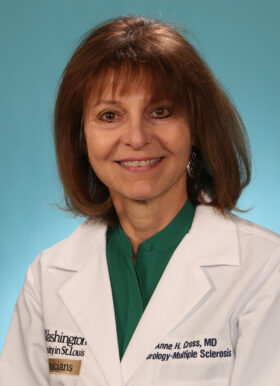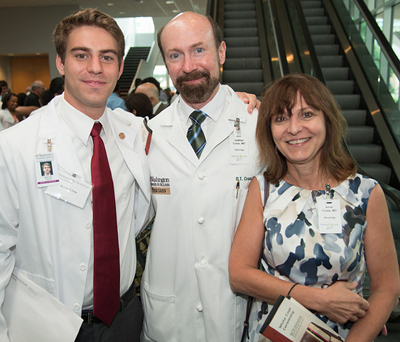Anne Cross, MD

Anne Cross, MD, is a professor of neurology and the Manny and Rosalyn Rosenthal – Dr. John Trotter MS Chair in Neuroimmunology. She specializes in multiple sclerosis, neuromyelitis optica, transverse myelitis and optic neuritis.
Please call 314-362-3293 for an appointment.
What happened in the course of schooling to influence you in choosing your specialty?
It was a family illness that got me interested in diseases of the brain. I enjoyed both psychiatry and neurology, but ended up choosing neurology.
I chose to specialize in multiple sclerosis (MS) because I knew three people, all around my age, who were diagnosed with the disease. One friend was an internal medicine resident and we spent a lot of time together when we were on call. It was upsetting to me that he got this illness. Because of my family member’s illness, I felt that there was so much unknown and at that time the medical profession could not help my friend with MS very much. I thought I should use my career to add a few pieces to the puzzle of neurologic disease.
The MS patients I cared for during my neurology residency, particularly because they were my age, really hit home. We had nothing to offer them to alter the course of MS and I realized we didn’t know much about this particular disease. The field of neuroimmunology was fascinating, and appeared to deserve much more study. Because I was interested in combining research and practice, it was an appealing sub-specialty.

What brought you to Washington University?
My husband is a neuroradiologist and we were both offered faculty positions here. We’re from Alabama, but had been living in the Northeast for our training – Washington D.C. and New York City. We liked the location of St. Louis, and also that it combined the slightly slower pace and civility of the South with the cultural opportunities of New York, such as the excellent St. Louis symphony. Of course, the real deciding point was that Washington University is a well regarded and tremendous institution – it was a very easy decision to make.
Which aspect of your practice is most interesting?
Research is most interesting because it exposes me to new ideas and enables me to discover new breakthroughs with the potential to help quite a few people. I also like seeing patients. I feel as if I’ve grown up with many of my patients because they have been my patients since I started here in the early 1990s. Our children have grown up at the same time — that’s nice too.
I’ve recently had some excellent fellows who then have joined our faculty – Rob Naismith, MD and Laura Piccio, MD, PhD. We’ve also trained some really talented people who have left Washington University to join the faculties of other good institutions. I enjoy teaching and working with these bright individuals. They are enthusiastic and energetic – and they teach me too.
What are the new developments in your field?
In medicine, we now have the capability to sequence the entire human genome. We are able to compare MS patients versus healthy people or people with other diseases. We can examine the genes that are different in MS patients who do poorly versus MS patients who do well. Future work will compare the genetics of those that respond to certain drugs for MS, vs. those that do not. Genetic analysis is only now in its “toddlerhood”, there is much more to be learned and so many potential therapeutic targets to be uncovered.
There are new MS treatments on the horizon. It won’t be long before we will have a whole host of new medications instead of the six drugs that are FDA-approved now for MS. Because of the various risks and side effects of individual drugs, in the future genomics and proteomics will play an important role in figuring out which patient would do best on which treatment at the time of diagnosis.
It’s really exciting to have so many more options for treatments, considering where we came from. It wasn’t that long ago when we didn’t have anything to offer our MS patients. I’ve enjoyed seeing this transformation happen in the MS field during my career.
How is the new imaging technique, diffusion tensor imaging (DTI), going to affect treatment of MS?
Standard magnetic resonance imaging (MRI) is great for diagnosing MS, but it’s not optimal for understanding the underlying pathology. We are trying to learn more with DTI, which is now mainly an experimental modality. DTI is a special type of MRI that can affect MS in two ways. First, it helps us better understand the disease. Because we don’t biopsy the human brain or spinal cord very often, we don’t understand the full breadth of the heterogeneity of the disease – how one person may differ from another. We don’t understand the evolution of the disease over time.
DTI can provide a non-invasive technique to better understand the pathology. I believe with the ongoing studies, DTI will prove to be very helpful. DTI can be useful as an endpoint in clinical trials to quickly recognize whether an agent is promising or not.
Why are we hearing more about pediatric MS?
MS in the pediatric age group has probably always been there to some extent; we are now recognizing it more.It is also possible that the rate of MS in children and adolescents is actually increasing. Pediatric MS is not really all that common and does not comprise a large percentage of the total MS population.
The MS Society has recently put considerable funding towards studying pediatric MS. The reason is that studying pediatric MS provides an opportunity to see the disease at its earliest stages. We can look at what may have happened in the lives of the children around the time they developed MS and this may provide clues to possible causes. We’ve learned a lot from pediatric MS, including information supporting an association of Epstein Barr virus with MS.
Where are you from?
I’m from Mobile, Alabama. I loved everything about living near the water — sports, seafood and just watching the waves.
Is there a particular award or achievement that is most gratifying?
In 1990, I received the Harry Weaver Neuroscience Scholar Award. That is a five-year career development award given by the National MS Society to young scientists who are judged to have a promising future. It includes a salary to get your career jump-started and funding for a research project. It was a big honor.
The scientific achievement that has been most gratifying was my work on B lymphocyte cell depletion as a treatment for MS. In 1999 I conceived of the studies, and by late 2001 had acquired funding to begin. In early 2002, I started the first clinical trial to study B cell depletion in MS patients and how that would alter the disease and the B cell factors in MS spinal fluid.
There was an FDA approved agent for use in B cell cancers and lymphomas that could deplete B cells in humans. But the company that made the agent was not interested in using it for MS. It was only after we were able to get funding from the National MS Society and National Institutes of Health to do the study that the company became interested. They then did their own multicenter trial which was completed before our single center study was completed. They actually beat us to the punch. Both studies showed B cell depletion to be very beneficial. Scientists from the company that made the drug told me they were flabbergasted at how positive the results were. Even though my paper was not the first to be published and I was “scooped” in the literature, we were all very happy with the results.
Also, before these studies, we didn’t know how important B cells were to the progression of the disease. When B cells were removed, we saw improvements. The study taught us more about MS itself.
What is the best advice you’ve ever received?
Do what you really want to do with your life — follow your passion. And never give up.
If you weren’t a doctor, what would you like to be doing?
I’ve lately become interested in energy and conservation. I would probably be doing research into more renewable energy sources and decreasing our dependency on oil.